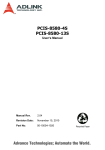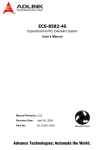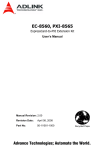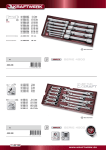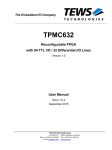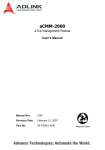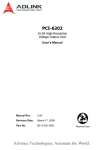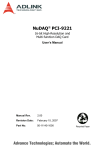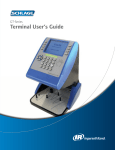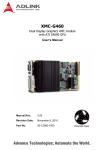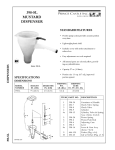Download PCES-8581-4S PCES-8581-13S PCI Express- to-PCI
Transcript
PCES-8581-4S PCES-8581-13S PCI Express-to-PCI Extension System User’s Manual Manual Revision: 2.00 Revision Date: October 19, 2007 Part No: 50-1S001-2000 Advance Technologies; Automate the World. PCES-8581-4S PCES-8581-13S User’s Manual Revision History Revision Release Date 2.00 2007/10/19 ii Description of Change(s) Initial Release PCES-8581-4S PCES-8581-13S User’s Manual Preface Copyright 2007 ADLINK TECHNOLOGY INC. This document contains proprietary information protected by copyright. All rights are reserved. No part of this manual may be reproduced by any mechanical, electronic, or other means in any form without prior written permission of the manufacturer. Disclaimer The information in this document is subject to change without prior notice in order to improve reliability, design, and function and does not represent a commitment on the part of the manufacturer. In no event will the manufacturer be liable for direct, indirect, special, incidental, or consequential damages arising out of the use or inability to use the product or documentation, even if advised of the possibility of such damages. Trademarks PCI Express® is a registered trademark of the Peripheral Component Interconnect Special Interest Group. Product names mentioned herein are used for identification purposes only and may be trademarks and/or registered trademarks of their respective companies. Preface iii PCES-8581-4S PCES-8581-13S User’s Manual Using this Manual Audience and Scope The PCES-8581-4S PCES-8581-13S User’s Manual is intended for hardware technicians and systems operators with knowledge of installing, configuring and using PCI Express®-to-PCI extension systems. This document is specifically intended to describe connecting ADLINK PCIS-8580-4S/PCIS-8505-13S PCI-to-PCIExtension Systems to a host computer or I/O devices for extended functionality. Manual Organization This manual is organized as follows: Preface: Presents important copyright notifications, disclaimers, trademarks, and associated information on the proper understanding and usage of this document and its associated product(s). Chapter 1, Introduction: Introduces the PCES-8581-4S/13S PCI Express®-to-PCI Extension System overview, its features, applications, and package contents. Chapter 2, Getting Started: Presents information on properly installing PCES-8581-4S/13S equipment and cabling a PCI Express® to PCI extension system. Chapter 3, Hardware Information: Presents layout information, technical drawings, jumper settings and configuration. Chapter 4, Troubleshooting: Provides basic information on quickly addressing configuration/setup/installation problems that may occur. Important Safety Instructions: Presents safety instructions all users must follow for the proper setup, installation and usage of equipment and/or software. Warranty Information: Presents important warranty information for users/manufacturers rights and responsibilities regarding ADLINK products and services. iv Preface PCES-8581-4S PCES-8581-13S User’s Manual Conventions Take note of the following conventions used throughout this manual to make sure that users perform certain tasks and instructions properly. Additional information, aids, and tips that help users perform tasks. NOTE: CAUTION: Information to prevent minor physical injury, component damage, data loss, and/or program corruption when trying to complete a task. WARNING: Information to prevent serious physical injury, component damage, data loss, and/or program corruption when trying to complete a specific task. Preface v PCES-8581-4S PCES-8581-13S User’s Manual Reference Documentation The following list of documents may be used as reference materials to support installation, configuration and/or the operation of the PCES-8581-4S/PCES-8581-13S. This list is prepared in alphabetical order (by vendor name, then by document title) for clarity. Vendor(s) Title Rev. ADLINK Technology, Inc. ADLINK PCIS-8580-4S/PCIS-850513S User’s Manual 2.01 PCI-SIG PCI Express® Base Specification 1.0a PCI-SIG PCI-to-PCI Bridge Architecture Specification 1.2 PCI-SIG PCI Local Bus Specification 3.0 vi Preface PCES-8581-4S PCES-8581-13S User’s Manual Getting Service Contact us should you require any service or assistance. ADLINK TECHNOLOGY INC. (HEADQUARTERS) Web Site: Sales & Service: Telephone No.: Fax No.: Mailing Address: http://www.adlinktech.com [email protected] +886-2-8226-5877 +886-2-8226-5717 9F No. 166 Jian Yi Road, Chungho City, Taipei 235, Taiwan, ROC ADLINK TECHNOLOGY AMERICA INC. Sales & Service: Toll-Free: Fax No.: Mailing Address: [email protected] +1-866-423-5465 +1-949-727-2099 8900 Research Drive, Irvine, CA 92618, USA ADLINK TECHNOLOGY CO. LTD. (BEIJING) Sales & Service: Telephone No.: Fax No.: Mailing Address: [email protected] +86-10-5885-8666 +86-10-5885-8625 Rm. 801, Power Creative E, No. 1, B/D Shang Di East Rd. Beijing, 100085 China ADLINK TECHNOLOGY CO. LTD. (SHANGHAI) Sales & Service: Telephone No.: Fax No.: Mailing Address: [email protected] +86-21-6495-5210 +86-21-5450-0414 4F, Bldg. 39, No.333 Qinjiang Road, Chao He Jing Hi Tech Park Shanghai, 200233 China ADLINK TECHNOLOGY CO. LTD. (SHENZHEN) Sales & Service: Telephone No.: Fax No.: Mailing Address: Preface [email protected] +86-755-2643-4858 +86-755-2664-6353 2F, C Block, Bld. A1, Cyber-Tech Zone, Gao Xin Ave. Sec 7, High-Tech Industrial Park S., Shenzhen, 518057 China vii PCES-8581-4S PCES-8581-13S User’s Manual ADLINK TECHNOLOGY INC. (EUROPE) Sales & Service: Toll-Free: Fax No.: Mailing Address: [email protected] +49-211-495-5552 +49-211-495-5557 Nord Carree 3, 40477 Düsseldorf, Germany ADLINK TECHNOLOGY INC. (INDIA) Sales & Service: Telephone No.: Fax No.: Mailing Address: [email protected] +91-80-6560-5817 +91-80-2244-3548 No. 1357, Ground Floor, "Anupama", Aurobindo Marg JP Nagar (Ph-1) Bangalore, Karnataka 560078, India ADLINK TECHNOLOGY JAPAN CORP. Sales & Service Telephone No. Fax No. Mailing Address [email protected] +81-3-4455-3722 +81-3-5333-6040 Asahiseimei Hatagaya Bld. 1-1-2 Hatagaya Shibuya-ku, Tokyo, Japan ADLINK TECHNOLOGY INC. (SOUTH KOREA) Sales & Service: Telephone No.: Fax No.: Mailing Address: [email protected] +82-2-2057-0565 +82-2-2057-0563 4F, Kostech Building, 262-2, Yahgjae-Dong, Seocho-Gu, Seoul, 137-130, South Korea ADLINK TECHNOLOGY SINGAPORE PTE. LTD. Sales & Service: Telephone No.: Fax No.: Mailing Address: viii [email protected] +65-6844-2261 +65-6844-2263 84 Genting Lane #07-02A, Cityneon Design Center, Singapore 349584 Preface PCES-8581-4S PCES-8581-13S User’s Manual Table of Contents PCES-8581-4S PCES-8581-13S............................................... i Revision History...................................................................... ii Preface .................................................................................... iii Copyright 2007 ADLINK TECHNOLOGY INC. ...............iii Disclaimer .......................................................................iii Trademarks .....................................................................iii Using this Manual ...........................................................iv Conventions .................................................................... v Reference Documentation ..............................................vi Getting Service ..............................................................vii Table of Contents................................................................... ix List of Figures ........................................................................ xi List of Tables........................................................................ xiii 1 Introduction ........................................................................ 1 1.1 Overview.............................................................................. 1 1.1.1 Controlling PCI with PCI Express®....................................... 1 1.2 Package Contents ............................................................... 3 1.3 Specifications....................................................................... 4 1.4 Features............................................................................... 5 1.5 Applications ......................................................................... 5 2 Getting Started ................................................................... 7 2.1 Installation Environment ...................................................... 7 2.2 Installing PCIe-8560 on a Host Computer ........................... 8 2.3 Installing PCI Peripheral Cards to an Extension Chassis .. 10 2.4 Cabling Host Computer to Extension Chassis................... 12 2.5 Power-ON/OFF Sequence................................................. 14 2.6 Remote Power-ON/OFF Functionality ............................... 15 2.7 LED Status......................................................................... 18 3 Hardware Information ...................................................... 19 3.1 Functional Block Diagram.................................................. 19 Table of Contents ix PCES-8581-4S PCES-8581-13S User’s Manual 3.2 PCIe-8560 Layout, Connectors and Jumpers.................... 20 3.2.1 PCIe-8560 S1/S2 Signal Equalizer Adjustments ................ 21 3.3 PCI-8565 Layout, Connectors and Jumpers...................... 23 3.4 RK-8005 4-Slot Extension Chassis.................................... 25 3.4.1 RK-8005 Chassis Mechanical Drawing............................... 25 3.5 RK-8014 13-Slot Extension Chassis.................................. 27 3.5.1 RK-8014 Chassis Mechanical Drawing............................... 27 3.6 BP-8005 Layout, Connectors and Jumpers ....................... 29 3.7 BP-8014 Layout, Connectors and Jumpers ....................... 33 3.8 Extension Cable Options ................................................... 36 4 Troubleshooting (FAQ)..................................................... 37 Important Safety Instructions............................................... 41 Warranty Policy ..................................................................... 43 x Table of Contents PCES-8581-4S PCES-8581-13S User’s Manual List of Figures Figure 2-1: PCIe-8560 to Host PC Installation Diagram .................... 9 Figure 2-2: PCI to Extension Chassis Installation Diagram ............. 11 Figure 2-3: Cabling 3 M Extension Cable to Host PC ...................... 12 Figure 2-4: Cabling 3 M Extension Cable to Extension Chassis...... 13 Figure 2-5: Host Computer connected to a PCI Extension System . 13 Figure 2-6: BP-8014 Remote Power-On/Off Diagram...................... 17 Figure 3-1: PCI Express Extension System Functional Block Diagram.......19 Figure 3-2: PCIe-8560 Mechanical Layout....................................... 20 Figure 3-3: PCI-8565 Mechanical Layout......................................... 23 Figure 3-4: RK-8005 Chassis Front and Back View......................... 25 Figure 3-5: RK-8005 Chassis Top View........................................... 26 Figure 3-6: RK-8005 Side View........................................................ 26 Figure 3-7: RK-8014 Front View ...................................................... 27 Figure 3-8: RK-8014 Back View....................................................... 27 Figure 3-9: RK-8014 Top View......................................................... 28 Figure 3-10: RK-8014 Side View........................................................ 28 Figure 3-11: BP-8005 Backplane Layout ........................................... 29 Figure 3-12: BP-8014 Backplane Layout ........................................... 33 Figure 3-13: Standard 3 M extension cable (ALC-PCEEXT-3) .......... 36 List of Figures xi PCES-8581-4S PCES-8581-13S User’s Manual This page intentionally left blank. xii List of Figures PCES-8581-4S PCES-8581-13S User’s Manual List of Tables Table Table Table Table Table Table Table Table Table Table Table Table Table Table Table Table Table Table Table Table Table Table Table Table Table 2-1: 2-2: 2-3: 2-4: 3-1: 3-2: 3-3: 3-4: 3-5: 3-6: 3-7: 3-8: 3-9: 3-10: 3-11: 3-12: 3-13: 3-14: 3-15: 3-16: 3-17: 3-18: 3-19: 3-20: 3-21: List of Tables PCIe-8560 to Host PC Chassis Installation Items ........... 9 PCI device to Host PC Chassis Installation Items ......... 11 Remote Power-ON/OFF Configuration.......................... 15 Remote Power-On/Off Diagram Description.................. 17 PCIe-8560 Connectors, Jumpers and LED ................... 20 PCIe-8560 Pin 1 and Pin 2 Equalizer Selection ............ 21 PCIe-8560 Pin 3 Output Swing Control ......................... 22 PCIe-8560 Pin 4 Output De-Emphasis Control ............. 22 PCI-8565 Connectors, Jumpers and LED ..................... 23 PCI-8565 JP1 Remote Power-ON/Off Connector.......... 24 PCI-8565 JP2 Spread Spectrum Clock Control............. 24 BP-8005 Connectors, Jumpers and LED....................... 30 BP-8005 CN1 LED Connector ....................................... 30 BP-8005 CN2 ATX Power Connector............................ 31 BP-8005 CN3 Fan Connector........................................ 31 BP-8005 CN4 ATX Power OK Status Connector .......... 31 BP-8005 JP1 LED Connector ........................................ 32 BP-8005 JP2 ATX Power Enable Connector................. 32 BP-8005 JP3 Fan Connector......................................... 32 BP-8014 Backplane Connectors and Jumpers.............. 34 BP-8014 JP2 ATX Power Enable Connector................. 34 BP-8014 JP2 ATX Power Enable Connector................. 34 BP-8014 FAN4, FAN5, and FAN6 +12 V Connector ..... 35 BP-8014 CN2 ATX Power Connector............................ 35 Optional Extension Cables ............................................ 36 xiii PCES-8581-4S PCES-8581-13S User’s Manual This page intentionally left blank. xiv List of Tables PCES-8581-4S PCES-8581-13S User’s Manual 1 Introduction This chapter introduces the PCES-8581-4S/13S PCI Express®to-PCI Extension System, presents a general overview and basic applications, its package contents, specifications, and features. 1.1 Overview Harnessing the bandwidth potential of PCI Express®, the PCES8581-4S and the PCES-8581-13S smart extension systems enable computers with a PCI Express® slot to remotely manage and control up to 13 PCI devices, using the high-speed PCI Express® interface. These extension systems operate in 32-bit/33 MHz configuration and come with complete end-to-end hardware and software transparency for the host system. Hardware devices installed in the extension system behave and work as if they are directly installed on the host system, requiring no additional drivers or software installation. The host system may be separated from the extension system at up to seven meters using high-quality shielded twisted copper cables. The robust and reliable PCI Express®-to-PCI extension systems are suited for portable test and measurement applications with high-density I/O requirement and are ideal in hazardous industrial control and automation environments. 1.1.1 Controlling PCI with PCI Express® Based on PCI Express® technology, PCES-8581-4S and PCES8581-13S provide bus expansion capability through the highspeed differential signal interface. The PCES-8581-4S and PCES8581-13S use a signal equalizer and a PCI Express®-to-PCI bridge to architecture a PCI Express® to PCI extension system. With our PCES-8581-4S and PCES-8581-13S, user can use an available PCI Express® slot to control an external PCI chassis. Because the PCI Express® Bridge is a transparent bridge, there is Introduction 1 PCES-8581-4S PCES-8581-13S User’s Manual no need to install any additional software when using PCI devices in the external chassis. The PCES-8581-13S and PCES-8581-4S implement a PCI Express®-based control of PCI modules. The technology consists of a PCIe-8560 card installed in the host computer, a shielded cable, and the extension system. The PCIe-8560 comes in a PCI Express® x1 footprint and communicates with the extension system's low-profile PCI-8565 via a twisted and shielded cable. The PCI-8565 converts the PCI Express® interface into a PCI bridge for additional PCI slots in the extension system. The link between host PC and the external chassis is a PCI Express® X1 link that represents a dual-simplex communications channel consisting of two, low-voltage differentially driven signal pairs. The signaling rate can reach up to 2.5 Gbps in each direction. Using the shielded and twisted cable, the maximum extension distance can be up to 7 M without decreasing the signal rate. 2 Introduction PCES-8581-4S PCES-8581-13S User’s Manual 1.2 Package Contents PCES-8581-4S X PCIe-8560 (packaged separately) X RK-8005 wall-mount chassis, pre-installed with: Z PCI-8565 card Z 5-slot backplane Z 200 W AC power supply X 3 m extension cable X AC power cord X Wall-mount kit for chassis X User's manual PCES-8581-13S X PCIe-8560 (packaged separately) X RK-8014 wall-mount chassis, pre-installed with: Z PCI-8565 Z 14-slot backplane Z 400 W AC power supply X 3 m extension cable X AC power cord X Wall-mount kit for chassis X Remote power-on cable X User's manual If any of the items on the contents list are missing or damaged, contact your ADLINK dealer. NOTE: Introduction 3 PCES-8581-4S PCES-8581-13S User’s Manual 1.3 Specifications PCIe-8560 (on host computer) X Compliant with PCI Express® Base Specifications (Rev. 1.0a) X PCI Express® x1 link with 2.5 Gb/s data throughput X Maximum extended distance of up to seven meters X Low-profile footprint, 68.90 mm (H) x 86.65 mm (W) X Power requirement: 3.3 V, 210 mA (max) PCI-8565 (on extension system) X Compliant with PCI-to-PCI Bridge Architecture Specifications (Rev. 1.2) X Supports 5 V and 3.3 V PCI bus X 32-bit/33 MHz full data throughput X Maximum extended distance of seven meters X Low-profile footprint, 64.41 mm (H) x 119.91 mm (W) X Power requirement: +3.3 V, 720 mA Operating and Storage Environments 4 X Operating temperature: 0°C to 50°C X Storage temperature: -20°C to 80°C X Relative humidity: 10% to 90%, non-condensing Introduction PCES-8581-4S PCES-8581-13S User’s Manual 1.4 Features X PCI Express® control of PCI cards X High-speed PCI Express® X1 interface X Compatible with 5 V and 3.3 V PCI bus X Supports 32-bit/33 MHz PCI interface X Provides four extended half-size PCI slots with built-in 200 W power supply in a shoebox size chassis (PCES-8581-4S) X Provides 13 extended full-size PCI slots with built-in 400 W power supply in 19" rack-mount chassis (PCES-8581-13S) X Extension lengths of 1 M, 3 M and 7 M X Complete hardware and software transparency X Compliant with PCI Express® Base Specification, Revision 1.0a X Compliant with PCI-to-PCI Bridge Architecture Specification, Revision 1.2 X Compliant with PCI Local Bus Specification, Revision 3.0 1.5 Applications These extension systems are suitable for: X Electronics manufacturing testing X High-density I/O systems X Industrial automation and control X Military and aerospace X Testing systems for remote and/or harsh environments X Video capture Introduction 5 PCES-8581-4S PCES-8581-13S User’s Manual This page intentionally left blank. 6 Introduction PCES-8581-4S PCES-8581-13S User’s Manual 2 Getting Started This chapter describes the installation environment, installation procedures, cabling the equipment, and instructions on poweringon/off the PCES-851-4S and PCES-851-13S PCI Express® to PCI Extension Systems. Diagrams and images of equipment mentioned are used for reference only. Actual system appearance may vary. NOTE: 2.1 Installation Environment Whenever unpacking and preparing to install any equipment described in this manual, please refer to the Important Safety Instructions chapter of this manual. Only install equipment in well lit areas on flat, sturdy surfaces with access to basic tools such as flat and cross head screwdrivers. The PCES-8581-4S and PCES-8581-13S contain several electrostatic sensitive components that can be easily damaged by static electricity. For this reason, the card and chassis should be handled on a grounded anti-static mat and the operator should wear an anti-static wristband during the unpacking and installation procedure. Please also inspect the components for apparent damage. Improper shipping and handling may cause damage to the components. Be sure there is no shipping and handling damage on the components before continuing. Do not apply power to any equipment if it has been damaged. CAUTION: Getting Started 7 PCES-8581-4S PCES-8581-13S User’s Manual 2.2 Installing PCIe-8560 on a Host Computer 1. Power-off your host computer. 2. Unscrew the housing of your host computer using a (cross-head or flat-head) screwdriver. Open the housing. 3. Locate your PCI Express® extension card (PCIe-8560) and remove it from its packaging. (Please wear antistatic gloves and use an anti-static surface when handling the card). 4. Install the PCIe-8560 in an available PCI Express® slot in your host computer. Be sure to firmly attach the PCIe8560’s bracket to the backplane of the host PC. 5. Close the chassis and re-install its housing screws. 8 Getting Started PCES-8581-4S PCES-8581-13S User’s Manual Figure 2-1: PCIe-8560 to Host PC Installation Diagram B B C C A A Item Description A Industrial PC or Desktop PC with X1 PCI Express® Slot B PCIe-8560 (PCI Express®-to-PCI extension host card) C PCI Express® Slot Table 2-1: PCIe-8560 to Host PC Chassis Installation Items Getting Started 9 PCES-8581-4S PCES-8581-13S User’s Manual 2.3 Installing PCI Peripheral Cards to an Extension Chassis CAUTION: The following instructions are for illustration purposes when attempting to install additional PCI devices to your extension chassis. Both RK-8005 and RK8014 extension chassis are pre-installed with one PCI-8565 extension card. 1. Locate your extension chassis (RK-8005 or RK-8014) and plug-in the AC power cord but DO NOT power-on the equipment. 2. Unscrew the four housing screws of the extension chassis using a (cross-head or flat-head) screwdriver. Open the top cover of the chassis. You should see a row of PCI slots (four slots for RK-8005 or 13 slots for RK-8014) along the backplane. 3. Locate your PCI device and remove it from its packaging. (Please wear anti-static gloves and use an antistatic surface when handling the card). 4. Install your PCI device in an available PCI slot and be sure to firmly attach it’s bracket to the backplane of the extension chassis. 5. Close the extension chassis and re-install its housing screws. 10 Getting Started PCES-8581-4S PCES-8581-13S User’s Manual Figure 2-2: PCI to Extension Chassis Installation Diagram C B D A Item Description A Extension chassis (RK-8005) B Extension chassis housing screws C Additional PCI card/device D Pre-installed PCI-8565 Table 2-2: PCI device to Host PC Chassis Installation Items Getting Started 11 PCES-8581-4S PCES-8581-13S User’s Manual 2.4 Cabling Host Computer to Extension Chassis Now that you have successfully installed the PCIe-8560 into the Host computer (or installed an additional PCI device in the extension chassis), you may connect the Host Computer and Extension Chassis with an extension cable. CAUTION: Do not remove the extension cable after the system is powered on. It may cause system errors or data loss. If the cable is unplugged improperly, reconnect it and reboot the host PC and extension chassis. 1. Locate your 3 M extension cable. 2. Connect the 3 M extension cable to the PCI Express® serial link connector (PCIe-8560) of your host PC. 3. Firmly attach the 3 M extension cable by tightening its retention screws. Figure 2-3: Cabling 3 M Extension Cable to Host PC 12 Getting Started PCES-8581-4S PCES-8581-13S User’s Manual 4. Connect the other end of the 3 M extension cable to the PCI-8565 serial link connector of the extension chassis (RK-8005 or RK-8014). Figure 2-4: Cabling 3 M Extension Cable to Extension Chassis Figure 2-5: Host Computer connected to a PCI Extension System Getting Started 13 PCES-8581-4S PCES-8581-13S User’s Manual 2.5 Power-ON/OFF Sequence To power-on the PCI express® extension system, follow these steps: 1. Check that the 3 M extension cable is properly connected to the host PC and extension chassis. 2. Power-on the extension chassis first. 3. Power-on the host PC. CAUTION: DO NOT remove the cable after the system and extension chassis are powered on. Disconnecting the cable while the system is running may cause unpredictable system errors and/or system crash. As the PCI Express®-to-PCI extension system is a standard PCIeto-PCI bridge interface, the BIOS will identify each device behind the PCI bridge and assign resource to each one during start up. Thus users have to power-on the remote chassis first in order to get appropriate resources from the BIOS. To power-off the PCI Express® extension system, follow these steps: 1. Power-off the host PC. 2. Power-off the extension chassis. CAUTION: 14 DO NOT power-off the extension chassis until the host PC is powered off. If the extension chassis is powered off while the host PC is on, the host PC may hang or crash. Getting Started PCES-8581-4S PCES-8581-13S User’s Manual 2.6 Remote Power-ON/OFF Functionality Optional functionality of the PCI express® extension system includes remote power-on/off via the ADLINK BP-8014 backplane. Once the BP-8014 is properly connected, configured, and enabled, users may remotely power-on/off the extension chassis via a host PC. The following table lists the connectors that enable remote poweron/off functionality. Part Number Connector/ Jumper Function PCI-8565 JP1 A signal is sent from JP1 on PCI-8565 which enables the RK-8014 to power-on when the host PC is powered on. BP-8014 JP2 ATX power enabling connector for BP-8014 Table 2-3: Remote Power-ON/OFF Configuration Please refer to sections 3.3, 3.4, 3.5, 3.6 and 3.7 for detailed layout, connectors and jumpers. NOTE: Getting Started 15 PCES-8581-4S PCES-8581-13S User’s Manual To enable remote power-on/off functionality, follow these steps: 1. Unscrew the four housing screws of the extension chassis (RK-8014) using a (cross-head or flat-head) screwdriver. Open the top cover of the chassis. 2. Disconnect the power-on button of the RK-8014 chassis panel. 3. Locate the JP2 connector on the BP-8014 as well as the JP1 of the PCI-8565. BP-8014 JP2 Connector PCI-8565 JP1 Connector 16 Getting Started PCES-8581-4S PCES-8581-13S User’s Manual 4. Using a controller cable, connect the JP1 of the PCI8565 and JP2 of the BP-8014. Figure 2-6: BP-8014 Remote Power-On/Off Diagram Item A Description PCI-8565 B BP-8014 C JP1 on PCI-8565. JP2 is used for controlling remote chassis power. D JP2 on BP-8014 is used to control the ATX power of RK-8014. E Remote power-on/off control cable. Table 2-4: Remote Power-On/Off Diagram Description Getting Started 17 PCES-8581-4S PCES-8581-13S User’s Manual 2.7 LED Status The LEDs on the front panel of the PCIe-8560 and PCI-8565 give power status information. The LEDs light up only when the following conditions are met: 18 X The extension cable between the PCIe-8560 (Host PC) and PCI-8565 (Extension Chassis) is properly connected. X The extension chassis is powered on. X The host PC is entering its Power-On Self Test (POST). Getting Started PCES-8581-4S PCES-8581-13S User’s Manual 3 Hardware Information 3.1 Functional Block Diagram Figure 3-1: PCI Express Extension System Functional Block Diagram Remote Chassis RK-8005 / RK-8014 Host PC Signal Equalizer Hardware Information External Cable PCI Slot PCI Express-toPCI Bridge 32-Bit/33MHz PCI Bus X1 PCI Express PCI Slot PCI-8565 PCIe-8560 PCI Slot 19 PCES-8581-4S PCES-8581-13S User’s Manual 3.2 PCIe-8560 Layout, Connectors and Jumpers Figure 3-2: PCIe-8560 Mechanical Layout D1 CN1 Connector/Jumper/LED S2 S1 Description S1 Adjusts Signal Equalizer S2 Adjusts Signal Equalizer CN1 D1 PCI Express® Serial Link Connector Serial Link Status LED Table 3-1: PCIe-8560 Connectors, Jumpers and LED 20 Hardware Information PCES-8581-4S PCES-8581-13S User’s Manual 3.2.1 PCIe-8560 S1/S2 Signal Equalizer Adjustments PCIe-8560 provides equalization, amplification and de-emphasis circuits to optimize signal integrity performance. With this design, PCIe-8560 allows signal transmission over long distances and reduces signal distortion. The following adjustment should be applied to both S1 and S2 simultaneously. The S1 transmits signals and S2 is receives signals. NOTE: Configuration Description ON Strongest equalizer levels (default) 1 2 3 4 1 2 3 4 ON Moderate equalizer level ON Weakest equalizer level 1 2 3 4 1 2 3 4 ON No equalizer Table 3-2: PCIe-8560 Pin 1 and Pin 2 Equalizer Selection Hardware Information 21 PCES-8581-4S PCES-8581-13S User’s Manual Configuration Description ON High level output signal swing (Default) 1 2 3 4 Normal level output signal swing ON 1 2 3 4 Table 3-3: PCIe-8560 Pin 3 Output Swing Control Configuration Description ON High level output signal swing (Default) 1 2 3 4 ON Normal level output signal swing 1 2 3 4 Table 3-4: PCIe-8560 Pin 4 Output De-Emphasis Control 22 Hardware Information PCES-8581-4S PCES-8581-13S User’s Manual 3.3 PCI-8565 Layout, Connectors and Jumpers Figure 3-3: PCI-8565 Mechanical Layout JP2 JP1 D1 CN1 Connector/Jumper/LED Description JP1 ATX power enabling connector. This connector is used for remote power-on control. JP2 Spread spectrum clock control CN1 PCI Express® serial link connector D1 Serial Link Status LED Table 3-5: PCI-8565 Connectors, Jumpers and LED Hardware Information 23 PCES-8581-4S PCES-8581-13S User’s Manual 2 3 JP1 Pin # Assignment 1 PWR-ON. This pin is used for remote power-on/off functionality. Connect this to JP2 on the BP-8014 to enable it. 2 N/C Table 3-6: PCI-8565 JP1 Remote Power-ON/Off Connector Setting Description 1 2 3 1 2 3 Enables spread spectrum control. When enabling spread spectrum control, the PCI clock will be modulated with a low frequency carrier, the peak EMI can be greatly reduced in the system. Disables spread spectrum control. Table 3-7: PCI-8565 JP2 Spread Spectrum Clock Control 24 Hardware Information PCES-8581-4S PCES-8581-13S User’s Manual 3.4 RK-8005 4-Slot Extension Chassis RK-8005 is a robust industrial chassis for accommodating the BP8005 backplane. The RK-8005 is a small, compact chassis (122mm X 195mm X 260mm) with a built-in 200W universal AC power supply. The RK-8005 is provided with a wall-mount kit so you can place it in many different environments. Only half-size PCI cards are suitable for the RK-8005. NOTE: 3.4.1 RK-8005 Chassis Mechanical Drawing Figure 3-4: RK-8005 Chassis Front and Back View Hardware Information 25 PCES-8581-4S PCES-8581-13S User’s Manual Figure 3-5: RK-8005 Chassis Top View Figure 3-6: RK-8005 Side View 26 Hardware Information PCES-8581-4S PCES-8581-13S User’s Manual 3.5 RK-8014 13-Slot Extension Chassis RK-8014 is a robust industrial chassis for accommodating the BP8014 backplane. The RK-8014 is a 177 mm X 481.1 mm X 438.5 mm chassis with a built-in 200W universal AC power supply. 3.5.1 RK-8014 Chassis Mechanical Drawing Figure 3-7: RK-8014 Front View 101.50mm [4.00in] 177.00mm [6.97in] 481.10mm [18.96in] Figure 3-8: RK-8014 Back View 429.30mm [16.91in] Hardware Information 27 PCES-8581-4S PCES-8581-13S User’s Manual 120.20mm [4.74in] 438.50mm [17.28in] Figure 3-9: RK-8014 Top View 448.50mm [17.67in] Figure 3-10: RK-8014 Side View 28 Hardware Information PCES-8581-4S PCES-8581-13S User’s Manual 3.6 BP-8005 Layout, Connectors and Jumpers The BP-8005 backplane provides 1 system slot and 4 available PCI peripheral slots. These PCI slots are for 32-bit and 33MHz PCI devices. The system slot is occupied by a pre-installed PCI-8565, please DO NOT install a CPU controller in this slot. CAUTION: Figure 3-11: BP-8005 Backplane Layout PCI4 PCI3 PCI2 PCI1 SYSTEM CN2 JP1 JP3 CN3 CN4 CN1 JP2 Top View Hardware Information Soldered Side 29 PCES-8581-4S PCES-8581-13S User’s Manual Connector/Jumper/LED Description CN1 LED connector CN2 ATX power connector CN3 Fan connector CN4 ATX power OK status connector JP1 LED connector JP2 ATX power enabler JP3 Fan connector System PCI1 to PCI4 System slot for extension card. This slot is modified for bus extension purposes and does not support general signal board controllers. Peripheral PCI Slot Table 3-8: BP-8005 Connectors, Jumpers and LED DO NOT plug CPU cards in the system slot. CAUTION: Pin # Assignment 1 Ground 2 +5 V Output CN1 Table 3-9: BP-8005 CN1 LED Connector 30 Hardware Information PCES-8581-4S PCES-8581-13S User’s Manual Pin # Assignment Pin # Assignment CN2 1 +3.3 V 11 +3.3 V 2 +3.3 V 12 -12 V 3 Ground 13 Ground 4 +5 V 14 PS-ON 5 Ground 15 Ground 6 +5 V 16 Ground 7 Ground 17 Ground 8 PW-OK 18 -5 V 9 5 VSB 19 +5 V 10 +12 V 20 +5 V Table 3-10: BP-8005 CN2 ATX Power Connector Pin # CN3 Assignment 1 N/C 2 +12 V 3 Ground Table 3-11: BP-8005 CN3 Fan Connector Pin # Assignment 1 Ground 2 PW-OK. ATX Power Status Table 3-12: BP-8005 CN4 ATX Power OK Status Connector Hardware Information 31 PCES-8581-4S PCES-8581-13S User’s Manual Pin # Assignment 1 Ground 2 LED Power, +5 V JP1 Table 3-13: BP-8005 JP1 LED Connector Pin # Assignment 1 Ground 2 PWR-ON, ATX Power Enable JP2 Table 3-14: BP-8005 JP2 ATX Power Enable Connector Pin # Assignment 1 Ground 2 +12 V JP3 Table 3-15: BP-8005 JP3 Fan Connector 32 Hardware Information PCES-8581-4S PCES-8581-13S User’s Manual 3.7 BP-8014 Layout, Connectors and Jumpers The BP-8014 backplane provides 1 system slot and 13 available PCI peripheral slots. The system is occupied by a pre-installed PCI-8565 PCI extension card. The remaining PCI slots are available for 5 V or universal PCI peripheral cards. Figure 3-12: BP-8014 Backplane Layout SYSTEM Slot CN2 JP1 JP4 JP5 JP3 FAN5 JP6 Hardware Information JP2 FAN4 FAN6 33 PCES-8581-4S PCES-8581-13S User’s Manual Connector/Jumper Description JP2 ATX power enabling connector JP6 ATX power OK status connector JP7 LED connector FAN4 Fan connector for +12 V fan FAN5 Fan connector for +12 V fan FAN6 Fan connector for +12 V fan CN2 ATX power connector Table 3-16: BP-8014 Backplane Connectors and Jumpers Pin # 1 2 JP2 Assignment 1 PWR-ON 2 If JP3 2-3 connected, this pin is Ground (Default). For PCES-8580-13S extension system, user should not change the setting of JP3. Table 3-17: BP-8014 JP2 ATX Power Enable Connector Pin # 1 2 JP6 Assignment 1 PWR-OK 2 5 Vsb, +5 V standby power Table 3-18: BP-8014 JP2 ATX Power Enable Connector 34 Hardware Information PCES-8581-4S PCES-8581-13S User’s Manual Pin # 3 21 Assignment 1 N/C 2 +12 V 3 Ground Table 3-19: BP-8014 FAN4, FAN5, and FAN6 +12 V Connector Pin # Assignment Pin # Assignment CN2 1 +3.3 V 11 +3.3 V 2 +3.3 V 12 -12 V 3 Ground 13 Ground 4 +5 V 14 PS-ON 5 Ground 15 Ground 6 +5 V 16 Ground 7 Ground 17 Ground 8 PW-OK 18 -5 V 9 5 VSB 19 +5 V 10 +12 V 20 +5 V Table 3-20: BP-8014 CN2 ATX Power Connector Hardware Information 35 PCES-8581-4S PCES-8581-13S User’s Manual 3.8 Extension Cable Options The PCI Express®-to-PCI extension system (PCES-8581-13S and PCES-8581-4S) is available with three different cables in length. These cables are designed to transfer high speed signals and have high immunity from electromagnetic interference. Figure 3-13: Standard 3 M extension cable (ALC-PCEEXT-3) Part Number Description ACL-EXPRESS-1 1 M, PCI Express®-to-PCI extension cable ACL-EXPRESS-3 3 M, PCI Express®-to-PCI extension cable ACL-EXPRESS-7 7 M, PCI Express®-to-PCI extension cable Table 3-21: Optional Extension Cables 36 Hardware Information PCES-8581-4S PCES-8581-13S User’s Manual 4 Troubleshooting (FAQ) This chapter describes frequently asked questions that may guide the user to solve minors problem they may encounter. This Troubleshooting (FAQ) applies to: X PCI Express®-to-PCI Extension System: including PCES8581-13S and PCES-8581-4S. X PCI Express-to-PXI Extension Kit: including PCIe-8560 and PXI-8565. In the following description, the products will be renamed as "PCI Express® Bus Extension Products". Question: What is the maximum extension length of PCI Express® Bus Extension Products? Answer: The maximum extension length is 7m. ADLINK offers three different cables in length for customer's applications, 1 M, 3 M and 7 M. Question: When using ADLINK PCI Express® Bus Extension Products, is there any additional driver or software required to install? Answer: ADLINK PCI Express® Bus Extension Products are designed to be standard PCI Express®-to-PCI bridges. It is not necessary to install additional drivers or software for support. Question: How many extension chassis can I connect to a host PC by using ADLINK PCI Express® Bus Extension Products? Answer: Due to the point-to-point architecture of PCI Express®, only one ADLINK PCI Express® Bus Extension Product can Troubleshooting (FAQ) 37 PCES-8581-4S PCES-8581-13S User’s Manual be supported by one chassis. However, users can select multiple extension chassis for different purposes. For example, a 4-slot extension chassis provides small and compact form factor while an 18-slot extension chassis provides more PCI slots. Theoretically, PCI specification allows up to 255 PCI bus segments. ADLINK PCI Express® Bus Extension Products do not limit the bus segment number. The maximum PCI bus segments may limited by your BIOS or operating system. Question: Is there any compatibility problems with the ADLINK PCI Express®-to-PXI extension kit? Answer: ADLINK PCI Express® Bus Extension Products are designed as standard PCI Express®-to-PCI Bridge. During PC boot up, your PC BIOS will search devices and assign resources such as, I/O, memory space and IRQ number, to each device according to its algorithm. Although PCI specification allows up to 255 bus segments in a PC system, the BIOS may not assign the correct and/or proper resource to each device in some complex PCI systems. Because the PCI Express® specification was released in 2002, most hardware and circuit board designers as of yet do not offer multiple PCI-to-PCI bridges. Most BIOS work for simple applications but may not work for multiple PCI bus segments and a variety of resource requests. We suggest customers choose PC equipment with Intel 945, 965 or later chipsets to adjust for these issues. Question: When I encounter compatibility problems, what should I do? Answer: Because most compatibility problems come from PCI resource assignments, customers should consult their PC vendors or BIOS vendors for help. Updating to the most current BIOS version may also resolve PCI resources problems. 38 Troubleshooting (FAQ) PCES-8581-4S PCES-8581-13S User’s Manual The following list are some indications that may help customers to deal with compatibility issues: 1. Disable the onboard device functions of your host PC to release IO resources. 2. Remove PCI devices plugged/installed in your host PC. 3. Connect an extension chassis which is single bus segment to the host PC. Plug a PCI device to an extension chassis one by one and boot each in sequence to check if your host PC can accommodate the PCI device or not. 4. You may try to plug the PCI Express® extension host card to a different PCI Express® slot. Troubleshooting (FAQ) 39 PCES-8581-4S PCES-8581-13S User’s Manual This page intentionally left blank. 40 Troubleshooting (FAQ) PCES-8581-4S PCES-8581-13S User’s Manual Important Safety Instructions For user safety, please read and follow all instructions, WARNINGS, CAUTIONS, and NOTES marked in this manual and on the associated equipment before handling/operating the equipment. X Read these safety instructions carefully. X Keep this user’s manual for future reference. X Read the specifications section of this manual for detailed information on the operating environment of this equipment. X When installing/mounting or uninstalling/removing equipment: Z X Turn off power and unplug any power cords/cables. To avoid electrical shock and/or damage to equipment: Z Keep equipment away from water or liquid sources; Z Keep equipment away from high heat or high humidity; Z Keep equipment properly ventilated (do not block or cover ventilation openings); Z Make sure to use recommended voltage and power source settings; Z Always install and operate equipment near an easily accessible electrical socket-outlet; Z Secure the power cord (do not place any object on/over the power cord); Z Only install/attach and operate equipment on stable surfaces and/or recommended mountings; and, Z If the equipment will not be used for long periods of time, turn off and unplug the equipment from its power source. X Never attempt to fix the equipment. Equipment should only be serviced by qualified personnel. X A Lithium-type battery may be provided for uninterrupted, backup or emergency power. CAUTION: Risk of explosion if battery is replaced by an incorrect type. Dispose of used batteries according to the instructions. Important Safety Instructions 41 PCES-8581-4S PCES-8581-13S User’s Manual X 42 Equipment must be serviced by authorized technicians when: Z The power cord or plug is damaged; Z Liquid has penetrated the equipment; Z It has been exposed to high humidity/moisture; Z It is not functioning or does not function according to the user’s manual; Z It has been dropped and/or damaged; and/or, Z It has an obvious sign of breakage. Important Safety Instructions PCES-8581-4S PCES-8581-13S User’s Manual Warranty Policy Thank you for choosing ADLINK. To understand your rights and enjoy all the after-sales services we offer, please read the following carefully. 1. Before using ADLINK’s products please read the user manual and follow the instructions exactly. When sending in damaged products for repair, please attach an RMA application form which can be downloaded from: http://rma.adlinktech.com/policy/ 2. All ADLINK products come with a limited two-year warranty, one year for products bought in China: X The warranty period starts on the day the product is shipped from ADLINK’s factory. X Peripherals and third-party products not manufactured by ADLINK will be covered by the original manufacturers' warranty. X For products containing storage devices (hard drives, flash cards, etc.), please back up your data before sending them for repair. ADLINK is not responsible for any loss of data. X Please ensure the use of properly licensed software with our systems. ADLINK does not condone the use of pirated software and will not service systems using such software. ADLINK will not be held legally responsible for products shipped with unlicensed software installed by the user. X For general repairs, please do not include peripheral accessories. If peripherals need to be included, be certain to specify which items you sent on the RMA Request & Confirmation Form. ADLINK is not responsible for items not listed on the RMA Request & Confirmation Form. Warranty Policy 43 PCES-8581-4S PCES-8581-13S User’s Manual 3. Repair service is not covered by ADLINK's two-year guarantee in the following situations: X Damage caused by not following instructions in the User's Manual. X Damage caused by carelessness on the user's part during product transportation. X Damage caused by fire, earthquakes, floods, lightening, pollution, other acts of God, and/or incorrect usage of voltage transformers. X Damage caused by inappropriate storage environments such as high temperatures, high humidity, or volatile chemicals. X Damage caused by leakage of battery fluid during or after change of batteries by customer/user. X Damage from improper repair by unauthorized technicians. X Products with altered and/or damaged serial numbers are not entitled to our service. X This warranty is not transferable or extendable. X Other categories not protected under our warranty. 4. Customers are responsible for all fees necessary to transport damaged products to ADLINK. 5. To ensure the speed and quality of product repair, please download an RMA application form from our company website: http://rma.adlinktech.com/policy/ Products with attached RMA forms receive priority. For further questions, please e-mail our FAE staff: [email protected]. 44 Warranty Policy



























































